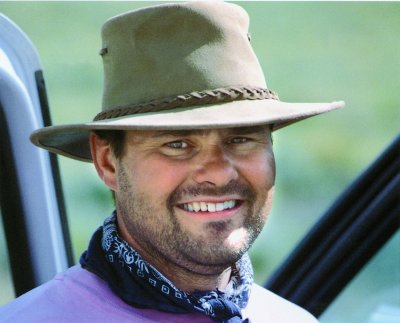 |
|||
|
|
|
|
|
 |
|||
|
|
|
|
|
 Dr. Christopher Beard gets a MacArthur Genius awardCarnegie Museum of Natural History Paleontologist is one of 25 Fellows named for the year 2000
Chris Beard, Associate Curator of Vertebrate Paleontology at Carnegie Museum of Natural History, is a paleontologist who is reshaping critical debates about the evolution of mammals, such as the earliest "Dawn monkey," Eosimias. His discovery in China of the earliest primates has changed thinking about the geographic origins of mammals, such as anthropoids and humans. If you project Beard's research far enough, the metaphoric Garden of Eden where familiar life forms began might have been in China, and not in Africa or the Middle East, as was previously thought. Among Beard's 25 Fellows in the year 2000 is the founder of the Audubon Society's Living Oceans Program, Carl Safina, who wants to dispel the notion that the oceans are a limitless source of food and other resources as well as a garbage dump. Also there is an architect and teacher who uses odd building materials such as old tires, bottles, and scrapwood to build beautiful, ingenious homes in remote parts of Alabama (Samuel Mockabee), and a photographer and scholar (Deborah Willis) who champions the rich legacy of African-American photography. Physicist Hideo Mabuchi at California Institute of Technology studies how atoms behave differently in a noisy environment, using optics to see interactions between pure quantum physics and noisy experimental environments. Susan Sygall, working from her own wheelchair, has a mission to improve the rights and change the lives of women with disabilities in the poorest regions of the world. There is a mystique to being named a MacArthur Fellow. When an individual is named, the news strikes like lightening on a blue June day. The person gets an unexpected phone call announcing that he or she has been named a Fellow from Daniel J. Sokalow, director of the program. Sokalow says the award winners' first reactions are familiar to him: "You're kidding me…I don't know what to say…I'm flabbergasted…flattered… you've made my life a lot easier…." The award is a half-million dollar grant spread over five years, with no strings attached. You can pay off your debts, travel, take time off from your institution to do research, seed your own program, create a scholarship, buy equipment--and never write a report. But you could never apply for this fellowship. Instead you have been nominated by a changing committee of anonymous experts who have a confidential voting system to assure candid opinions. After selecting driven, focussed people who are trying with their life's work to make the world better or more understandable, the MacArthur Foundation backs up its choice with the wisdom that these individuals themselves will know the wisest way to use the money. The Foundation wants to guarantee them time to think, to address their most fundamental issues, and gives them the seed money or the venture capital to advance their own specific intellectual, social, or artistic enterprises. The John D. and Catherine T. MacArthur Foundation has been selecting and supporting people of exceptional creativity, with a record of significant accomplishment, and the potential for still greater achievement, since the program began in 1981. Each year between 20 and 40 are named, reaching a total of 588 this year. The Foundation itself does not use the word "genius," since it's a limiting term that defines only one aspect of true life-long creativity. Still, the press has used the term "Genius Awards" for years. President Ellsworth Brown of Carnegie Museums of Pittsburgh sees the MacArthur award as good for the scientist, the museum, and the city: "I am thrilled for Chris and tremendously proud of him and his colleagues. His research brings international attention to Pittsburgh and confirms the work of our museum." Likewise the chairman of the Carnegie Museum of Natural History Board, George F.Eichley, sees the importance of the award as solidifying the museum's reputation as one of the foremost research institutions in the world: "This is scientific inquiry of the highest standard and fulfills a significant part of the museum's mission." Director Sokalow of the MacArthur Fellows program says simply, "We think of Chris as a discoverer, bold, serious, and highly creative." |
|
|
|
|
|
|
All rights reserved. E-mail: carnegiemag@carnegiemuseums.org |
|||